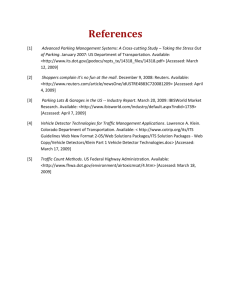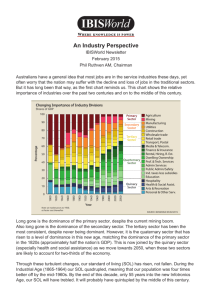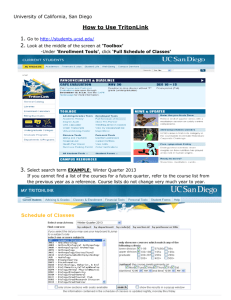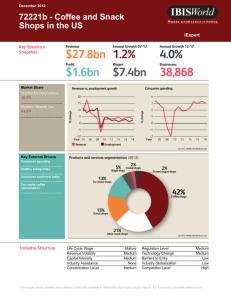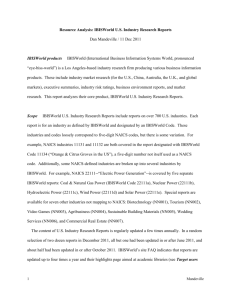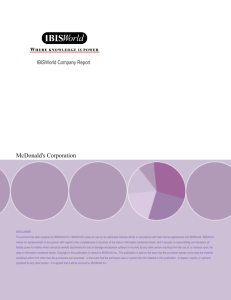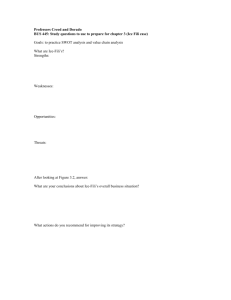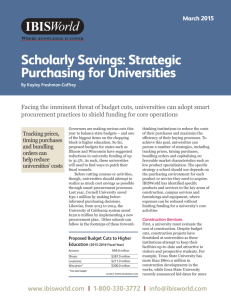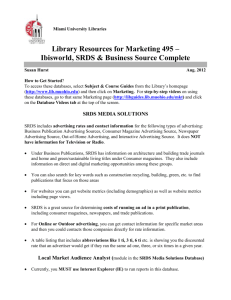Endless Summer: How Six Seasonal Industries Stay
advertisement
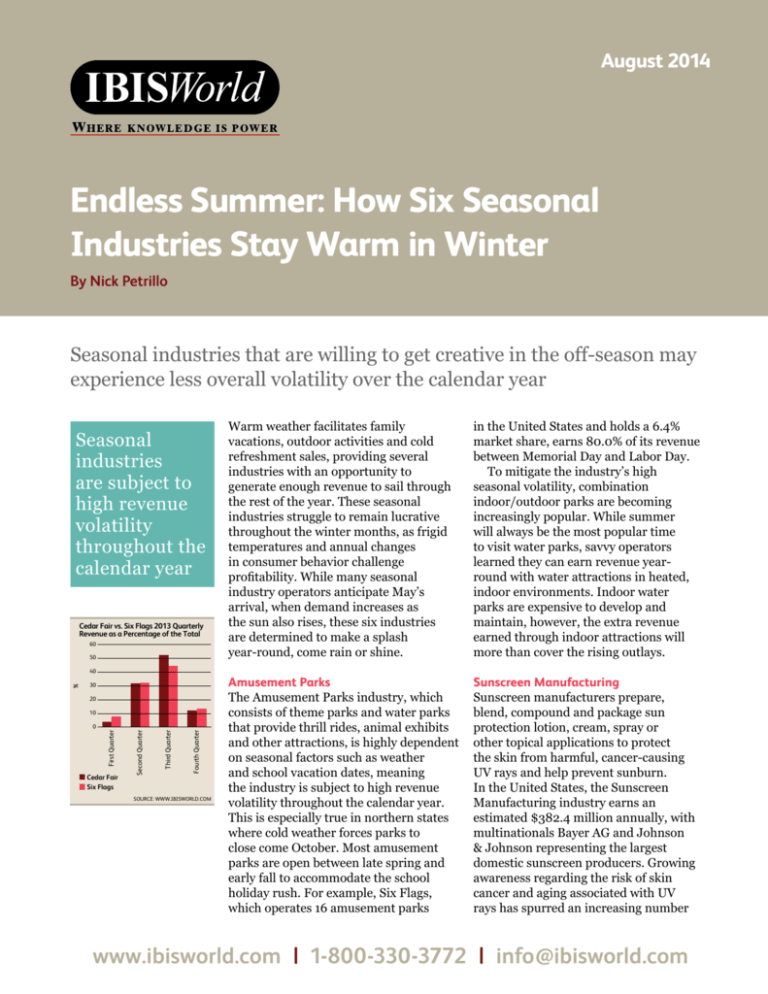
www.ibisworld.com January 2014 1 August 2014 Follow on head on Master page A Endless Summer: How Six Seasonal Industries Stay Warm in Winter By Nick Petrillo Seasonal industries that are willing to get creative in the off-season may experience less overall volatility over the calendar year Seasonal industries are subject to high revenue volatility throughout the calendar year Cedar Fair vs. Six Flags 2013 Quarterly Revenue as a Percentage of the Total 60 50 30 20 10 Third Quarter Fourth Quarter Cedar Fair Six Flags Second Quarter 0 First Quarter % 40 SOURCE: WWW.IBISWORLD.COM Warm weather facilitates family vacations, outdoor activities and cold refreshment sales, providing several industries with an opportunity to generate enough revenue to sail through the rest of the year. These seasonal industries struggle to remain lucrative throughout the winter months, as frigid temperatures and annual changes in consumer behavior challenge profitability. While many seasonal industry operators anticipate May’s arrival, when demand increases as the sun also rises, these six industries are determined to make a splash year-round, come rain or shine. in the United States and holds a 6.4% market share, earns 80.0% of its revenue between Memorial Day and Labor Day. To mitigate the industry’s high seasonal volatility, combination indoor/outdoor parks are becoming increasingly popular. While summer will always be the most popular time to visit water parks, savvy operators learned they can earn revenue yearround with water attractions in heated, indoor environments. Indoor water parks are expensive to develop and maintain, however, the extra revenue earned through indoor attractions will more than cover the rising outlays. Amusement Parks The Amusement Parks industry, which consists of theme parks and water parks that provide thrill rides, animal exhibits and other attractions, is highly dependent on seasonal factors such as weather and school vacation dates, meaning the industry is subject to high revenue volatility throughout the calendar year. This is especially true in northern states where cold weather forces parks to close come October. Most amusement parks are open between late spring and early fall to accommodate the school holiday rush. For example, Six Flags, which operates 16 amusement parks Sunscreen Manufacturing Sunscreen manufacturers prepare, blend, compound and package sun protection lotion, cream, spray or other topical applications to protect the skin from harmful, cancer-causing UV rays and help prevent sunburn. In the United States, the Sunscreen Manufacturing industry earns an estimated $382.4 million annually, with multinationals Bayer AG and Johnson & Johnson representing the largest domestic sunscreen producers. Growing awareness regarding the risk of skin cancer and aging associated with UV rays has spurred an increasing number www.ibisworld.com | 1-800-330-3772 | info @ibisworld.com www.ibisworld.com August 2014 2 Endless Summer: How Six Seasonal Industries Stay Warm in Winter Baskin Robbins 2013 Quarterly Revenue as a Percentage of the Total 30 % 20 10 Fourth Quarter Third Quarter Second Quarter First Quarter 0 SOURCE: WWW.IBISWORLD.COM The Home Depot, Inc. 2013 Quarterly Revenue as a Percentage of the Total 30 % 20 10 Fourth Quarter Third Quarter Second Quarter First Quarter 0 SOURCE: WWW.IBISWORLD.COM Anheuser-Busch InBev 2013 Quarterly Revenue as a Percentage of the Total 30 % 20 10 Fourth Quarter Third Quarter Second Quarter First Quarter 0 SOURCE: WWW.IBISWORLD.COM of consumers to use sunscreen over the past decade. However, customer orders for sun-care products are highly seasonal, which has historically resulted in higher sun-care sales to retailers during the late winter through midsummer months. Convincing consumers that sunscreen is essential beyond the summer months is not an easy task. However, producers are increasingly marketing sunscreen as both a health and beauty product that helps nourish skin. Additionally, more evidence supports nonsummer months as an important time of year to continue routine use of sunscreen during outdoor activities. Studies have shown that dangerous overexposure to UV radiation can still occur during the coldest months, particularly in high-altitude areas and locations where UV rays can be reflected by the snow. For skiers and snowboarders across the country, sunscreen may soon join helmets as an essential item to grab before hitting the slopes. Ice Cream & Gelato Store Franchises The sluggish economy, rising competition from frozen yogurt stores and increasing health consciousness of consumers have put pressure on the Ice Cream and Gelato Store Franchises industry over the past five years. However, it is the high seasonality of demand that poses the biggest challenge for ice cream store operators. Demand usually surges during summer when consumers flock to ice cream eateries for relief from rising temperatures, but most consumers prefer to warm up with hot coffee and cookies during the colder months As a result of seasonal demand, many ice cream stores shut down or convert their menus to sell a higher proportion of winter treats when ice cream demand falls with the first leaves in autumn. Another increasingly lucrative way for ice cream and gelato stores to quell declining sales in the cooler months is to wholesale their products to supermarket chains and restaurants. For example, restaurant chain Friendly’s, which is most famous for its ice cream sundaes, now sells its ice cream products to 7,500 supermarkets nationwide, including a new contract with Walmart. In-home ice cream consumption is rising and restaurants often prefer to sell locally produced desserts such as gourmet ice cream. Breweries The summer season generally correlates with much higher sales for the Breweries industry. Barbecues, federal holidays, vacations and extended travel all contribute to the increased consumption of alcohol during the hot summer months. Only a few years ago, ice-cold weather was a sure sign of cooling beer sales; however, in today’s diverse market for alcohol, each turn of a calendar page marks another major marketing opportunity for US brewers. Limitededition seasonal flavors have become serious revenue earners, particularly for brewers of craft beer. Pumpkin and cinnamon spices are popular fixtures for the fall season, cream stouts and extra bock offerings provide a thicker consistency for cold winter nights and light, citrusy beers have become spring staples for many consumers. Home Improvement Stores Home improvement stores generate a significant portion of sales in the warmer months, not just from home improvement materials and supplies, but also from summer retail items such as barbecue grills, outdoor pools and other leisure goods. Home improvement store operators enjoyed a prosperous summer in 2014, as homeowners in the northeast repaired damage caused by severe winter snowstorms, and the housing market rebound encouraged people to invest in their dwellings. However, sales at major home improvement stores including Home Depot and www.ibisworld.com August 2014 3 Endless Summer: How Six Seasonal Industries Stay Warm in Winter About IBISWorld Inc. Recognized as the nation’s most trusted independent source of industry and market research, IBISWorld offers a comprehensive database of unique information and analysis on every US industry. With an extensive online portfolio, valued for its depth and scope, the company equips clients with the insight necessary to make better business decisions. Headquartered in Los Angeles, IBISWorld serves a range of business, professional service and government organizations through more than 10 locations worldwide. For more information, visit www.ibisworld.com or call 1-800-330-3772. Contact: Media Relations media@ibisworld.com IBISWorld Sales & Subscriptions Phone: 1-917-267-0351 www.ibisworld.com Lowe’s tend to drop off significantly during the cooler months, when severe weather causes declines in both home improvement activity and leisure time. Home improvement stores attempt to mitigate losses in cooler months through increased holiday shopping campaigns. Black Friday deals, afterChristmas promotions and weekly circular advertisements have all become staples of the industry’s recent splurge in off-season marketing. Home improvement stores are also selling a larger array of consumer staples, such as toilet paper and cleaning supplies, to generate more foot traffic during winter. Landscaping Services Landscaping, maintenance, lawn care and exterior home projects are often put on ice during the colder months. However, as the US real estate market continues to recover from its prolonged supply glut, new and existing homes are undergoing an increasing amount of landscaping services throughout the year. In particular, landscapers have increased the number of services aimed at preserving lawns and gardens over the winter months. This process of ‘winterization’ includes services such as autumn fertilization, aeration, mowing and raking services, all of which are considered investments toward ensuring the grass is always greener on your side of the street. Additionally, many landscaping businesses use their existing equipment to provide valueadded fall and winter services such as snow plowing, salting, leaf clean-up, gutter cleaning and firewood, enabling operators to rake in revenue year-round. www.ibisworld.com | 1-800-330-3772 | info @ibisworld.com At IBISWorld we know that industry intelligence is more than assembling facts. It is combining data with analysis to answer the questions that successful businesses ask. Identify high growth, emerging and shrinking markets Arm yourself with the latest industry intelligence Assess competitive threats from existing and new entrants Benchmark your performance against the competition Make speedy market-ready, profit-maximizing decisions Who is IBISWorld? We are strategists, analysts, researchers and marketers. We provide answers to information-hungry, time-poor businesses. Our goal is to give you the real-world answers that matter to your business in our 700 US industry reports. When tough strategic, budget, sales and marketing decisions need to be made, our suite of Industry and Risk intelligence products give you deeply researched answers quickly. IBISWorld Membership IBISWorld offers tailored membership packages to meet your needs. Join and become an industry expert! Disclaimer This product has been supplied by IBISWorld Inc. (‘IBISWorld’) solely for use by its authorized licensees strictly in accordance with their license agreements with IBISWorld. IBISWorld makes no representation to any other person with regard to the completeness or accuracy of the data or information contained herein, and it accepts no responsibility and disclaims all liability (save for liability which cannot be lawfully disclaimed) for loss or damage whatsoever suffered or incurred by any other person resulting from the use of, or reliance upon, the data or information contained herein. Copyright in this publication is owned by IBISWorld Inc. The publication is sold on the basis that the purchaser agrees not to copy the material contained within it for other than the purchasers own purposes. In the event that the purchaser uses or quotes from the material in this publication – in papers, reports, or opinions prepared for any other person – it is agreed that it will be sourced to: IBISWorld Inc. © Copyright 2014. IBISWorld Inc.
